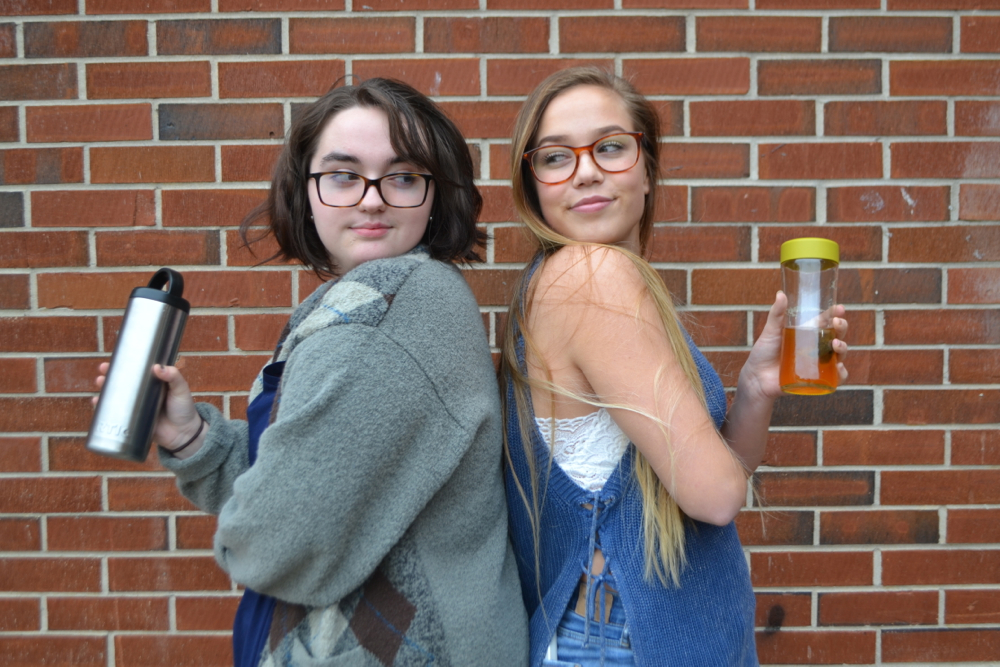Coffee: Cup o’ death or delicious social enricher?
January 11, 2018
Coffee: more than just “bitter” for the body
Coffee, the main source of caffeine for many, could cause more harmful effects than good. Coffee shops like Starbucks and Dunkin Donuts thrive off selling thousands of cups of coffee every morning. Smithsonian states that 80% of adults drink coffee daily, but with every cup of coffee consumed, several detrimental health effects can arise.
Not commonly considered a drug, caffeine creates easy addictions and affects people’s health. Caffeine, a stimulant drug, speeds up the the amount of time messages travel from the body to the brain and quickly becomes a reliant wake up call. Addiction symptoms, although relatively short-term, can include sleep deprivation, fertility problems, migraines, and a multitude of other health issues.
“I am an avid coffee drinker, and I do get headaches all the time. Since I drink so much coffee, I rely on it sometimes because if I skip my morning dose I’ll end up with a killer migraine,” junior Mary Catherine Toth said.
Although coffee will give the individual a boost of energy in the mornings, this can affect one’s sleep schedule at night. According to Popsugar Fitness, drinking coffee close to six hours before bedtime will disrupt one’s sleep. Coffee, a remedy for drowsiness in the mornings, may result in the extreme and not allow sleep to come naturally to an individual at night.
Headaches and migraines, a common problem for coffee consumers, results from the continuous drinking of this caffeinated drink. The Spruce states that caffeine headaches most commonly occur because of caffeine withdrawal. Caffeine withdrawal also causes muscle pains, nausea, and other flu-like symptoms.
Although scientists see no direct correlation between caffeine and fertility problems, some studies show women struggle to conceive after they drink large amounts of coffee. Women who consume more than six ounces of coffee, one serving, may also face issues regarding assisted conception procedures, but experts do not know exactly why this happens.
The one organ that keeps the body ticking, the heart may also deteriorate due to caffeine intake. Everyday Health says that caffeine directly burdens the heart and in high doses can raise the blood’s level of epinephrine, which can lead to high blood pressure and increased heart rates.
To avoid all the harmful effects from coffee, several healthy alternatives can give an individual double the amount of energy than coffee. Fashion designer and beauty insider Lauren Conrad recommends eating an apple everyday for carbs to fuel the body, and the fructose in an apple gives the body the same amount of energy boost as a cup of coffee.
Tea, another common alternative for coffee, comes in many different varieties, such as black, green, and other herbal blends. Most tea tastes sweet naturally, unlike coffee which is better, so do not worry about the double scoop of cream and sugar.
“I do enjoy tea a lot and I would totally switch out my coffee for tea since it can give off the same effect,” Toth said.
Healthy alternatives to coffee that offer more energy do not receive enough appreciation, hence, society relies on their morning cup of joe as their only morning wake up call.
Skip the cup of coffee and brew a pot of tea with a side of apple slices. An apple a day really does keep the doctor away.
Coffee serves up social brews and societal benefits
Before the average American makes breakfast, they often sit down for a cup of coffee. All around the world, people partake in the variations of hot beans roasted to perfection. A gathering place for social interactions and dates, coffee shops act as a hotspot for activity.
“Coffee encourages people to sit down and talk, and it helped develop a community,” Honors World History and AP Comparative Government teacher Carol Galloway said.
Coffee and its respective shops took credit for partially sparking the Enlightenment and the spread of ideas about human rights, encouraging communication and new thought processes through interaction. People through all walks of life convene in coffee houses. These coffee houses even took the title of “penny universities” for acting as places of learning and conversation. Countless instances of how coffee changed the course of human history proves the beauty and relevance of the popular drink.
The economic stimulation that comes along with coffee as a cash crop changed whole economies and helped push countries such as Brazil, Vietnam, Colombia, and Indonesia to new stages of development.
“Coffee sharpens the mind. They sat down and talked about ideas, [such as] early capitalism, and the rise of the middle class. Coffee contributed to the development of trade and markets, like in the Netherlands. There’s a really great novel by David Liss called The Coffee Trader, which illustrates this really well,” Galloway said.
Outside of the social benefits, coffee reduces a person’s risk for heart disease, cancer, and diabetes. Thousands of people worldwide suffer from hormone imbalances, which serves as the root of many diseases such as Type 2 Diabetes, affecting two percent of the population with insulin resistance. Naturally, through the incorporation of caffeine, coffee increases mental and bodily related activities, making people motivated to roll out of bed in the morning and take on the day, helping reduce the chance of heart disease and boosting the metabolic system.
As fuel for the modern worker, coffee has brought people together since the beginning of its cultivation and introduction into the diets and cups of everyday consumers. Coffee culture brought forth social change, and coffee shops today act as a meeting place for people and have since the 1800’s.
A tool for emotional growth and a treat for the soul, coffee has changed the course of human history and made it much tastier.


